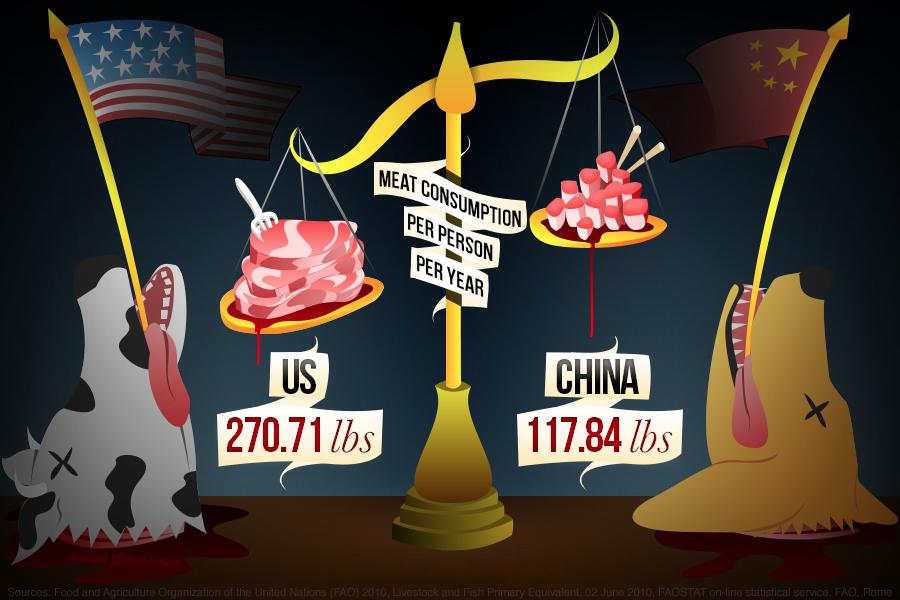In the city of Yulin, within Eastern China, thousands of locals gather for the annual Summer Solstice festival, also known as “Dog Meat” Festival.
Yulin, which translates in English to “jade forest,” is home to about 6 million people. It is a city filled with picturesque views and a lively downtown. Luxurious homes rest on top of lush green hills and are camouflaged by the abundance of nature— but just across the greenery, smells of decaying dogs and carcasses fill the air and streets of downtown.
Ancient Chinese folklore says the festival originated six hundred years ago when the founder of the Ming Dynasty, Zhu Yuanzhang, and his troops killed barking dogs as they seized the town. After their victory, dog meat was served at the feast in celebration.
While most Americans are appalled by even the mere idea of chowing down (no pun intended) on their pet, Maxie— the locals of Yulin, as well as people in the Philippines, Korea and Indonesia find it no different than enjoying a slab of beef next to some vegetables.
I, myself find little difference between eating a cow versus a dog. However, I am also a vegan with a passion for trying to understand the life of farm animals. I can say that due to my upbringing in an upper-middle class family— my cultural perspective subconsciously comes knocking and reminds me of the miniscule difference I feel between having to eat one or the other.
Vice News recently released a video of the Yulin dog meat festival, in which sick and malnourished, as well as healthy-looking dogs are packed into compact crates with no room between them.
Open-air market vendors showcase cats and dogs dangling by metal hooks to attract customers. In an article by CNN World, it was reported that the price of dog meat has doubled since 2011, raising the price to $6 a kilogram.
If you are wondering about food safety for dog meat, many questions start to raise concern.
First off, the Chinese government does not treat the festival as an official holiday, therefore there is no type of government regulation. Secondly, because of the lack of rules and responsibility, sick and infected dogs, as well as household pets are sold without going through any type of sanitation process, nor checked for diseases. That is, unless you count the blowtorch used to torture them at the beginning of the killing and skinning processes.
Note that the Chinese government advises civil servants, as well as medical professionals and teachers to not consume dog meat at the annual festival.
Locals believe eating this type of meat is healthy, as well as a cultural activity that is executed with pride and willing participation. However, because so many dogs in China are ridden with bacteria and infections, it not only puts their health at risk, but also adds to the exceedingly growing pollution problem that obliterates the air quality.
In a letter written by the President and CEO of Humane Society International, Andrew Rowan, Ph.D. urged the Chinese government to stop this festival.
And they did take some action. All signs that advertised dog meat were forcibly removed, as well as items on the menu consisting of dog meat. Unfortunately the slaughtering and consuming of dog meat is continuing at an all time high, and price.
Due to the high demand, street dogs are not enough to keep people full. In the previously mentioned Vice video, dogs are being seen darted outside their homes and kidnapped, thrown into trucks and slammed into crates to be killed at the hands of the vendors.
As if activists weren’t furious enough already.
Maybe as Americans we would like to believe our animals are treated well and grazed on a lush farm before being served to our plates, but as Paul McCartney said, “If slaughterhouses had glass walls, everyone would be a vegetarian.”
Eating dog meat in China is customary in many households— yet activists seem to be focusing on the mass consumption done at the festival.
Quoted in an article by CNN World, a butcher said, “This is our tradition and we are used to eating dog. It’s our culture and we won’t change.”
According to a study conducted by NPR, the total U.S. meat consumption was 52.2 billion pounds in 2012.
It is extremely difficult to separate oneself from not believing in the concepts we were taught from cultural values and expectations. To many Americans, eating a Big Mac is civilized in comparison to eating the neighborhood pets.
This makes many Americans seem to have double standards. Pigs are consumed in abundance, all forms and variations— yet in cognitive studies, pigs and hogs outsmart 3-year-old children and live fairly social lives, unless confined and born into gestation crates.
So what is the difference between Americans eating burgers and bacon to Chinese people eating cats and dogs? Maybe the opposers are vegetarians or vegans, or maybe they are okay with the fact that the walls of slaughterhouses aren’t made of glass. Is it such a difference besides being one of cultural relativity or is it just because we cannot handle seeing cruelty so bluntly shoved in front of our face?













